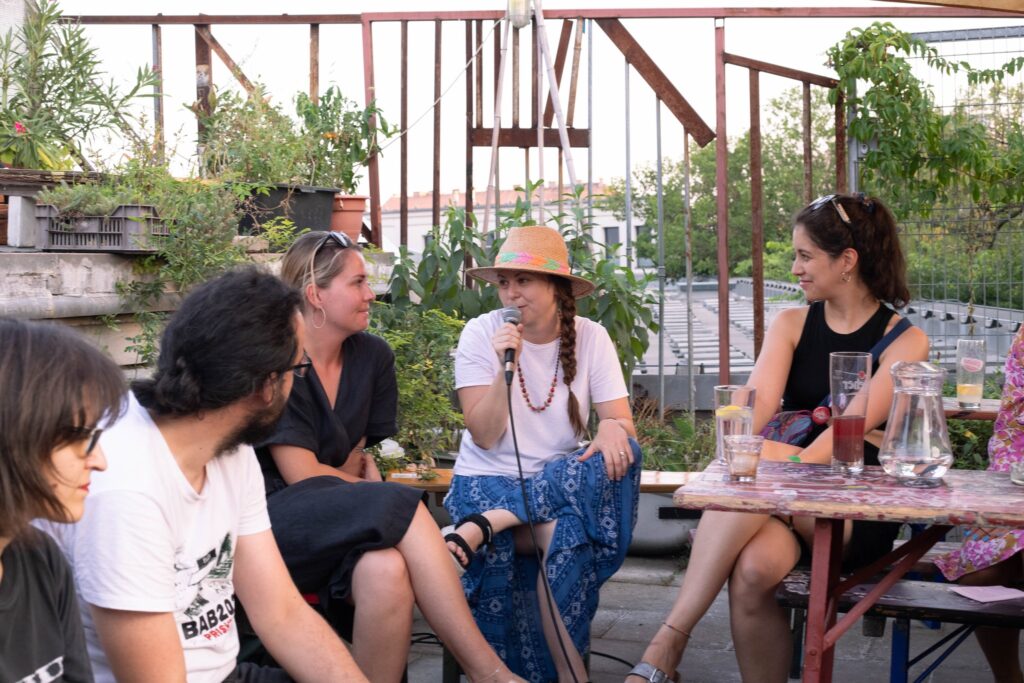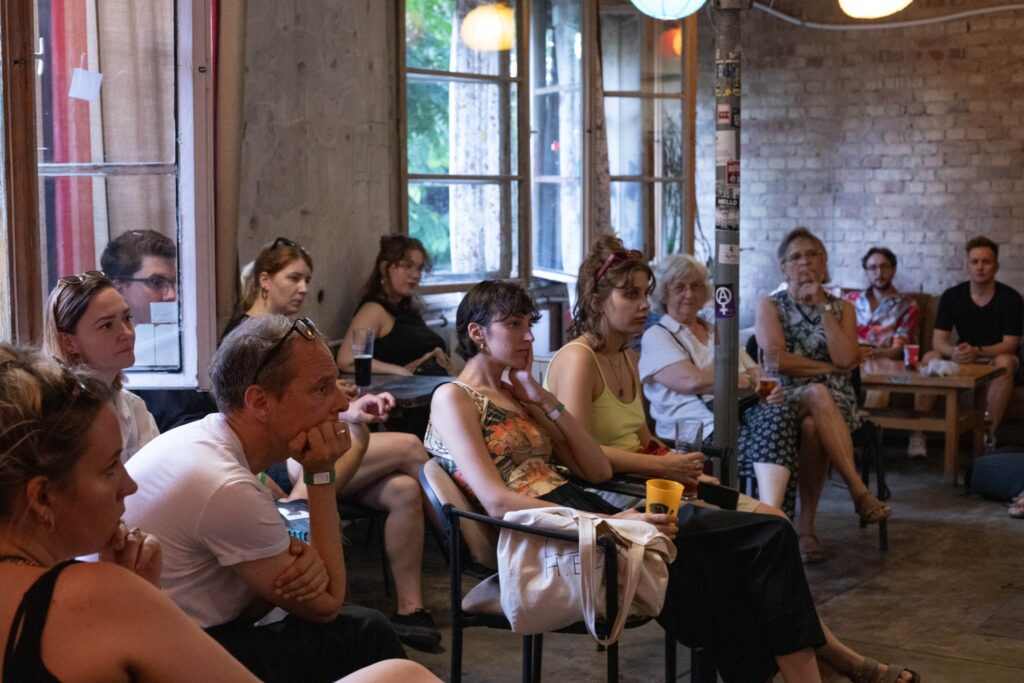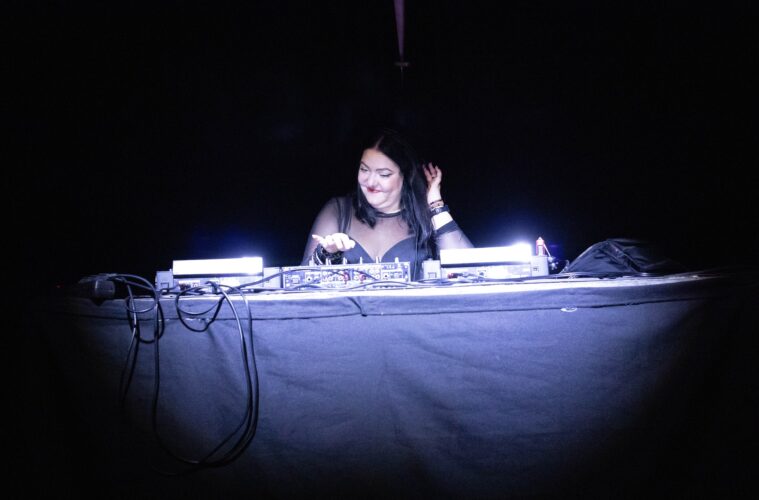Back at the end of May, while aimlessly scrolling through my Facebook feed, the event for Ladyfest 2024 in Budapest appeared before me. The festival’s Hungarian version was first organized in 2017, and after a few years of break, it returned this year to support female creators in the underground art scene, whether in literature, music, or visual arts. Ladyfest provides a safe environment for female performers where they can freely experiment, as their performances are met with support and genuine interest rather than judgment or criticism.
As I read on the website, Ladyfest was originally an idea born in the 2000s on the American music scene to boost women’s cultural visibility. Since then, the original concept has spread widely, creating a unique and informal international network of autonomous underground festivals.
This year’s program
This year’s event in Budapest promised exciting programs. During the days, there were different roundtable discussions with the Szépírók Társasága, Auróra Közösségi Ház, and Fekete Zaj, or under the name ‘Kritikus kultúra,’ Kata Oltai, Lívia Páldi, and Zsu Zsuró talked about current challenges, opportunities and solutions in different fields of culture. The organizers also offered music workshops: we could experiment with pop music (NÜX project) and a guitar workshop (Viki Taskovics), all in a safe, judgment-free space. On the second day, we could browse through Kalóz Records’ selection of female albums.
Most of the Ladyfest events took place at Gólya. For one afternoon, it was also held at the ISBN Gallery, which recently moved to a new, larger location. There, Friss Hús organized movie screenings and discussions with the directors, focusing on topics like transgenerational trauma, the burden of motherhood, and the pursuit of unrealistic beauty ideals. After the movies and discussions, Bea Istvánkó, the founder of the ISBN Gallery, gave a tour of the feminist publications in the shop.
In the evenings, we got to listen to some live music performances. The Ladyfest organizers put out an open call for female bands, DJs, and selectors to apply. The performing bands represented a wide range of genres, from folk and indie to alt, pop, and even punk, showcasing a lot of diversity. There were up-and-coming artists too, who had only played a few gigs so far, like Dysfunctionals and Sárkánygarbó. We also heard performances from groups that came together just for this event, like Szendék Zsüjával (Laura Szende, Natalie Szende, Zsani Liszkai, Andrea Görcz). And, of course, there were more experienced artists in the lineup, like Nora Volosinovszki, aka feryne with her always badass electro set, and the Ladyfest audience could listen to Zsuzsa Varga again as a returning performer.

Literature, Identity, and Community: Takeaways from Ladyfest
I arrived at the roundtable session starting at 6:00 PM, held on the rooftop of Gólya. I took my seat with a lavender Békanő lemonade in hand, waiting to see what answers I would get to the question, “Is writing literature a profession, therapy, or a hobby?” The table and microphone were surrounded by active writers and/or poets from the Szépírók Társasága: Veronika Bán-Horváth, Andrea Pásztor, Lili Hanna Seres, Anna Emília Szűcs, and Anna Vados. They quickly agreed that writing literature is definitely a profession. I was happy about that—why shouldn’t those working in the field refer to it that way? However, I also understood why it’s a question. I still wonder if it’s possible to make a living from it. Does it provide a stable income? How and where can I publish my work? And I could list even more questions that constantly pop up in my mind. The invited speakers discussed these difficulties and challenges during the rest of the conversation. Many of them related to the idea that literature as a profession is often belittled; they often receive feedback like “Writing is easy; it’s not even work,” or “For you, writing is just relaxation.” But those who are involved know that it’s often the exact opposite. I can’t help but wonder: do male writers get the same comments?
I want to say I was surprised to hear that most of the invited speakers are multi-talented writers/poets and not just focused on writing. But I wasn’t too shocked because I quickly recognized myself in that and saw many people around me in the same situation. It really highlights how much we are pushed into having multiple sources of income, regardless of gender.
I also received some insights about how more and more writings are exploring women’s stories, generational trauma, and parallels. Yet, instead of being positively received by the industry or the audience, the conversation revealed that their surroundings often react by saying these topics are overused and they don’t understand why it’s necessary to write about them again and again. But let’s face it, these issues still aren’t emphasized enough, and you won’t find any publisher’s bookshelf filled with them.
The invited speakers also discussed labels like “writer” and “poet,” discussing how each of them identifies and how much they relate to those titles. This always raises a question for me about how much these labels distort the profession—regardless of whether it’s related to literature or not. I wonder who has the authority to decide why someone gets a specific label and why that particular label is attached to them.

After the roundtable session ended, I went down to the concert hall, where I listened to the four performers of the day, hoping the music would help me zoom out from the challenges of the literary profession. The first act was Sárkánygarbó, and their Kundera-inspired lyrics really shifted my current mindset. I was amazed by how well music and literature can work together. Next up was the m.a.d.a.m. band, who had a bit of a jazzy, experimental, and folk vibe. I connected with their occult atmosphere, heartfelt lyrics, and feminine energy. My personal favorite was Csalogány; not only because of her voice and music but also for the courage she showed by turning part of the stationary audience into a circle dance performance. Then, thanks to Dysfunctionals, I was reminded of my younger self, reading Bravo magazine and listening to Avril Lavigne. It felt nice to get lost in that nostalgia. The Sunday night, and the festival itself, ended up with Szendék Zsüjával, which turned out to be a very experimental performance featuring electronic elements, singing, guitars, and really cool visuals.
Then I started to head home with the tired city on that Sunday evening. As I stepped out of Gólya, I didn’t expect how suddenly reality would hit me: a young girl stopped me crying on Orczy, and the city center was filled with super weird characters, making me feel unsafe being alone. At that moment, the magic of Ladyfest faded quickly, and I had to force myself to bring it back because I didn’t want that to not be my reality. I don’t want to forget that it happened, that there was a space and opportunity for it. I don’t want to forget the organizers, the performers, the speakers, the audience. The smiles, the sparkling eyes, the excitement, the collaborations, the awareness, the boldness. I don’t want my bubble to burst. I want this bubble to be strong and as big as possible. That’s part of why this article was born – to keep a trace of my experience and inspire many female performers and creators in the scene. I want us to keep searching for and finding those communities where we can draw strength from, where we can experiment freely, and where we can find ourselves.
Written by Julcsi Domján.
Julcsi lives in Budapest and works as a freelance journalist and copywriter on various online platforms. She is a dual path seeker: a reading writer, a writing reader, a rural urbanite, a zine fanatic, a melancholic dream chaser, and an economist studying literature.
Photo credits: Rozi Kassai
You can find the Hungarian version of this article here.

